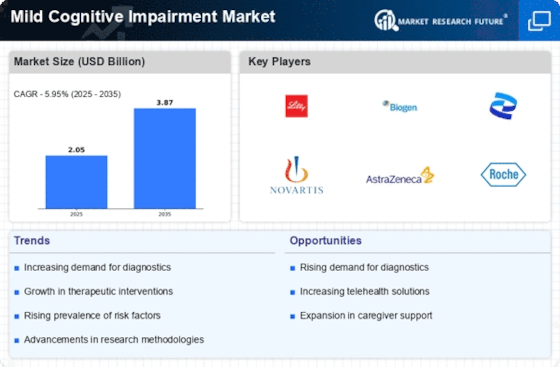Market Share
Mild Cognitive Impairment Market Share Analysis
The mild cognitive impairment (MCI) sector is growing as people realize the importance of brain health. Companies in this industry are employing strategic placement to detect, treat, and manage minor cognitive impairment. MCI is between dementia and aging-related cognitive deterioration.
Businesses take part in early detection and prevention programs for mild cognitive impairment (MCI) because they know how important they are. Tools for cognitive screening, campaigns to raise awareness, and collaboration between healthcare professionals are all being used to speed up treatments and improve patient results. Companies are producing MCI-specific drugs. Researchers are developing novel medications and cognitive enhancement therapies to reduce or halt cognitive deterioration in moderate cognitive impairment (MCI). The big trend at MCI right now is digital health products. Companies are making apps for smartphones and items that you can wear to constantly test your brain ability. Doctors can also use these tools to keep an eye on small changes in people's minds. In addition, they get more patients involved. Because MCI has such a big impact on patients and their families, groups are teaching and helping patients. Caregivers and people with MCI can get knowledge, tools, and mental help from these programs. This completes MCI's management and brings the businesses together. Working with study centers can help MCI learn more about technology. By working with study and educational institutions, businesses can get access to cutting-edge studies, make contributions to MCI science, and boost their image in the industry. Businesses are using telemedicine to keep an eye on people with mild cognitive impairment (MCI) from afar as it becomes more common. This lets doctors keep an eye on changes in brain function, change medicines, and provide ongoing care, which improves patient results and the market's usefulness. Creating personalized care plans and looking into personalized medicine methods are important steps to take. The way people are treated is based on genetics and other testing tools used by organizations. Businesses respect clinical study involvement and following the rules more and more. When MCI treatments are done according to the rules set by the government, they are safe and successful. Firms can gain science and medical authority and show that their products work by taking part in clinical studies. Because brain health problems affect people all over the world, businesses are moving into international markets. To do this, they have to change how they do things to fit different healthcare systems, societies, and rules. This will help them become the top managers in MCI around the world.


















Leave a Comment